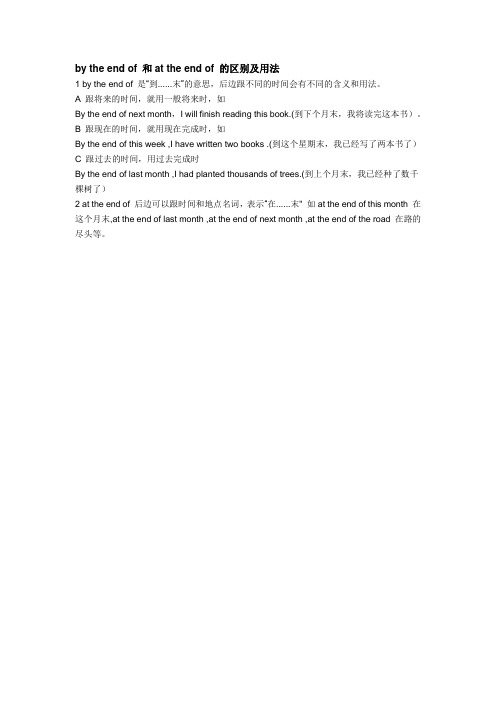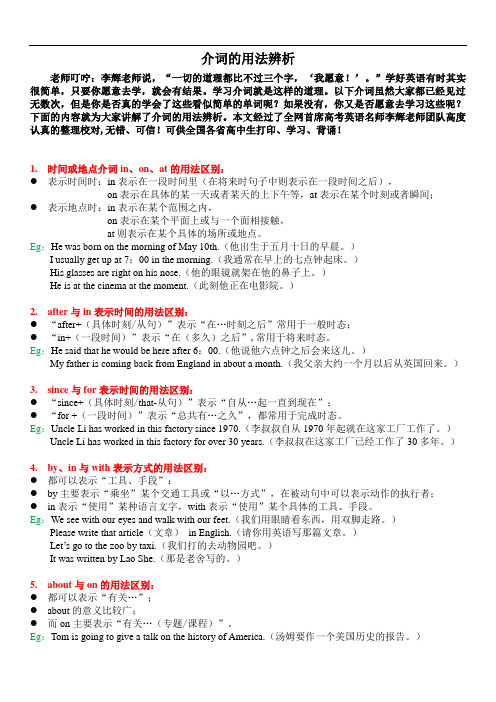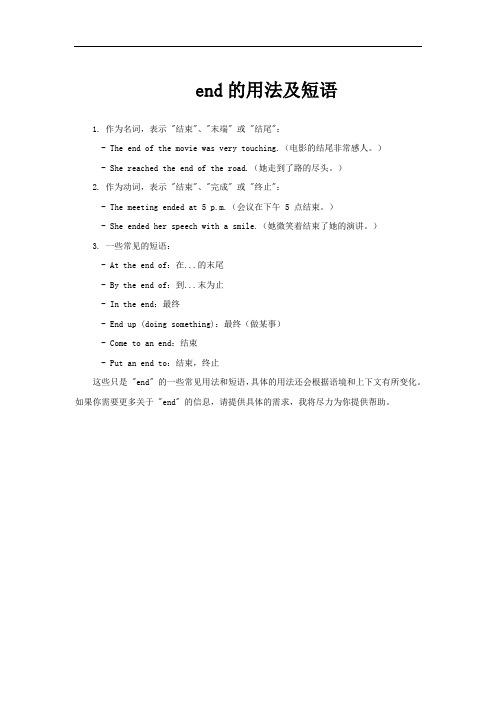by the end of 和at the end of 的区别及用法
by the end of 和at the end of 的区别及用法

by the end of 和at the end of 的区别及用法
1 by the end of 是“到......末”的意思,后边跟不同的时间会有不同的含义和用法。
A 跟将来的时间,就用一般将来时,如
By the end of next month,I will finish reading this book.(到下个月末,我将读完这本书)。
B 跟现在的时间,就用现在完成时,如
By the end of this week ,I have written two books .(到这个星期末,我已经写了两本书了)C 跟过去的时间,用过去完成时
By the end of last month ,I had planted thousands of trees.(到上个月末,我已经种了数千棵树了)
2 at the end of 后边可以跟时间和地点名词,表示“在......末" 如at the end of this month 在这个月末,at the end of last month ,at the end of next month ,at the end of the road 在路的尽头等。
介词的用法辨析

姓名,年级:时间:介词的用法辨析老师叮咛:李辉老师说,“一切的道理都比不过三个字,‘我愿意!’。
”学好英语有时其实很简单,只要你愿意去学,就会有结果。
学习介词就是这样的道理。
以下介词虽然大家都已经见过无数次,但是你是否真的学会了这些看似简单的单词呢?如果没有,你又是否愿意去学习这些呢?下面的内容就为大家讲解了介词的用法辨析。
本文经过了全网首席高考英语名师李辉老师团队高度认真的整理校对,无错、可信!可供全国各省高中生打印、学习、背诵!1.时间或地点介词in、on、at的用法区别:●表示时间时:in表示在一段时间里(在将来时句子中则表示在一段时间之后),on表示在具体的某一天或者某天的上下午等,at表示在某个时刻或者瞬间;●表示地点时:in表示在某个范围之内,on表示在某个平面上或与一个面相接触,at则表示在某个具体的场所或地点。
Eg:He was born on the morning of May 10th.(他出生于五月十日的早晨。
)I usually get up at 7:00 in the morning.(我通常在早上的七点钟起床。
)His glasses are right on his nose.(他的眼镜就架在他的鼻子上。
)He is at the cinema at the moment。
(此刻他正在电影院。
)2.after与in表示时间的用法区别:●“after+(具体时刻/从句)”表示“在…时刻之后”常用于一般时态;●“in+(一段时间)”表示“在(多久)之后”,常用于将来时态。
Eg:He said that he would be here after 6:00。
(他说他六点钟之后会来这儿。
)My father is coming back from England in about a month.(我父亲大约一个月以后从英国回来。
)3.since与for表示时间的用法区别:●“since+(具体时刻/that—从句)”表示“自从…起一直到现在”;●“for +(一段时间)”表示“总共有…之久",都常用于完成时态. Eg:Uncle Li has worked in this factory since 1970。
at the end of ,by the end of 和in the end

除了今天 , 哪一天我都有空。 。
H l e l esbet ecp h s s e i sa t jc xe t yi . k lh u s p c .! ’
除汤姆之外 , 我们 以前都去过那里 。
T e i n tigb t a l ntero h r s o n u b ei h o m. e h at
英语中三个较容易混淆的短语, 它们的区别在手:
1ntee d意思为 。 . n ih 最后 ” “ 、 终于 ” ,相 当于 a t
n h n h o t p d c yn n a g e . I t ee dt e b y s p e r i ga dlu h d o
n t n ,eey ig h , ht w e , hs o ig vrhn ,w o w a, h r w oe等词 连 h t e
用。例如 :
We alw n u i l e tb t m. h
除了这顶之外, 我还有三顶别的帽子。 2ecp 强调将该词后面的宾语部分排除在某一 . et x 整体 之外 , : 即 不包括 ……在内。例如 :
ol g e eed tem n e r et e? u di t n , okyo gr ah nh h h t i
z9 7 期l 语 考 备l7 0 ̄ - 英 中 必 3 o 8
Gr m m a o s s a rF cu e
语 法重 点
2a teedo 表 示“ ……的尽头, . n f th 在 末尾” 其后要 ,
除了物理之外, 哪一科他都喜欢。 3ecp r . eto 强调。 x f 除外 ” 的部分 与“ 内含 ” 的部分不
一
房间里只有一张桌子 。
介词的用法辨析

介词的用法辨析老师叮咛:李辉老师说,“一切的道理都比不过三个字,‘我愿意!’。
”学好英语有时其实很简单,只要你愿意去学,就会有结果。
学习介词就是这样的道理。
以下介词虽然大家都已经见过无数次,但是你是否真的学会了这些看似简单的单词呢?如果没有,你又是否愿意去学习这些呢?下面的内容就为大家讲解了介词的用法辨析。
本文经过了全网首席高考英语名师李辉老师团队高度认真的整理校对,无错、可信!可供全国各省高中生打印、学习、背诵!1.时间或地点介词in、on、at的用法区别:●表示时间时:in表示在一段时间里(在将来时句子中则表示在一段时间之后),on表示在具体的某一天或者某天的上下午等,at表示在某个时刻或者瞬间;●表示地点时:in表示在某个范围之内,on表示在某个平面上或与一个面相接触,at则表示在某个具体的场所或地点。
Eg:He was born on the morning of May 10th.(他出生于五月十日的早晨。
)I usually get up at 7:00 in the morning.(我通常在早上的七点钟起床。
)His glasses are right on his nose.(他的眼镜就架在他的鼻子上。
)He is at the cinema at the moment.(此刻他正在电影院。
)2.after与in表示时间的用法区别:●“after+(具体时刻/从句)”表示“在…时刻之后”常用于一般时态;●“in+(一段时间)”表示“在(多久)之后”,常用于将来时态。
Eg:He said that he would be here after 6:00.(他说他六点钟之后会来这儿。
)My father is coming back from England in about a month.(我父亲大约一个月以后从英国回来。
)3.since与for表示时间的用法区别:●“since+(具体时刻/that-从句)”表示“自从…起一直到现在”;●“for +(一段时间)”表示“总共有…之久”,都常用于完成时态。
九下module1travel 知识点总结

--by the end到/在最后,表示到那时候,常常可以根据语境、时态看出。by the end of…后一般跟完成时态。
E.g.By the end of last month, I had learned 200 English words.
Module 1:Travel
重点单词/短语
direct, succeed, exactly, because of, as long as, take care, take off
重点句型
1. The train was full of people, and I had to stand for over three hours.
because
连词
后跟句子,是主句的直接原因
6.But the pilot succeeded in landing on time.不过飞行员成功地按时着陆了。【**succeed动词,意为“成功”。succeed in doing sth.意为“成功做成某事”。The boy succeeded in working out the maths problem.这个男孩成功地解出了这道数学题。
1)manage后接名词或动词不定式作宾语,不接动名词。manage to do sth.暗含succeed in doing sth.之意,指“(经过努力和克服困难之后)将某事坐成”,即经过努力达到了目的,重点在于结果。He managed to finish the work on time.
--in the end在最后,一般表示结果,强调的就是结果。E.g.I was saved in the end.。
八年级英语外研版下册(考点剖析+典题精讲)5

Module 5Problems初中英语考点剖析与典题精讲系列三点剖析单词·典句·考点able adj.能够【巧记提示】table(n.桌子)→able(adj.能干的)【经典例句】They were able to get away from the fire.他们能从大火中逃生。
【考点聚焦】1)派生词:ability n.能力;本领反义词:unable adj.不能的;不会的2)构成短语be able to相当于can,后面接动词原形,表示“能够”。
但是can只有现在和过去(could)两种时态,而be able to还可用于一般现在时态和将来时态。
beat v.打;打败【巧记提示】b+eat(v.吃)【经典例句】He beat all the other players and became the best one.他打败所有其他的队员,成为最棒的一个。
【考点聚焦】1)注意beat的过去式和过去分词分别是:beat; beat2)注意beat和win之间的区别:beat与win作“战胜;打败”讲时,主要区别反映在后面的宾语上。
beat后面的宾语应当是“人”,即比赛或是战斗的对手。
win后面的宾语是“物”即比赛;战斗;战争;奖金;金钱等。
shame n.惋惜的事;遗憾;羞耻【巧记提示】name(n.名字)→shame(n.羞愧)【经典例句】What a shame that it rained today.今天下雨了,真可惜。
【考点聚焦】1)构成句式:It’s a shame...表示“做……真遗憾/羞愧”,注意本句式后面只能接动词不定式或是that从句,不能接动名词。
2)shame构成以下短语:feel shame at...因……而感到羞愧;what a shame真遗憾bring shame on...是……丢脸;to one’s shame是某人感到羞耻的是……refuse v.拒绝;谢绝【经典例句】The big clock refused to welcome the New Y ear.这只大钟不愿迎接新年。
in the end of和at the end of的例句

in the end of和at the end of的例句
以下是“in the end of”和“at the end of”的例句,但请注意,“in the end of”并不是常用的英语表达,通常我们只说“in the end”。
因此,我会先给出一个“in the end”的例句,然后再给出一个“at the end of”的例句。
使用“in the end”的例句:
After much deliberation, she decided to accept the job offer in the end. 这句话的意思是:经过深思熟虑后,她最终决定接受这份工作邀请。
使用“at the end of”的例句:
I always like to sum up my thoughts at the end of a meeting.
这句话的意思是:我总喜欢在会议结束时总结我的想法。
为了避免混淆,请确保在正确的上下文中使用这些短语,并根据需要选择合适的一个。
在大多数情况下,“at the end of”用于表示在某个时间、地点或事件的结束时,而“in the end”则用于表示经过一系列事件或考虑后的最终结果。
八年级英语译林版下册Unit2_复习教案

八年级英语Unit2复习教案教学目标:1、复习本单元重点单词、词组;2、复习现在完成时及其用法。
教学过程:知识点解析Unit2 --Welcome+Reading 1.0(travel) all over the world.课本例句:Hey, Eddie. Where are you going?用法解析:hey, 感叹词三会课本例句:I don’t th ink用法解析:“英语的否定转移”.在学英语的过程中,学生常将这样的句子"我认为这不是个好主意." 译为"I think it isn't a good idea." 而将这句英语译成汉语时,学生又会译为"我不认为这是个好主意." 老师又会说译错了,这不符合"I don't think..." 句型,应译为"l don't think it's a goodidea."在英语中,当主语为第一人称,谓语动词为think, believe,suppose,expect,imagine 等,其后的宾语从句为否定句时,要将从句的否定词转移到主句中,即主句的谓语动词用否定式,而从句的谓语动词用肯定式。
这种语法现象就是否定前移。
例:我认为Jenny不会来参加聚会。
I don't think Jenny will come to the party.我认为你的答案不对。
I don't think your answer is right.I miss you so much!用法解析:miss (v.) 想念,错过--- misses (三单)例题训练:She couldn’t stop________ (想念)her parents while she was studying abroad.We’re having a fantastic time here.用法解析:fantastic (adj.) 极好的--- wonderful (同义词)have a fantastic time = have a good/great/pleasant/nice/wonderful time;类似短语:have a bad/hard time (玩得不开心,过得艰难,日子不好过)have a good time; enjoy oneself; have fun.后面加doing例:They come here to relax and have a good time.=They come here to relax and enjoy themselves.=They come here to relax and have fun.例题训练:fantastic time the children are having !A.WhatB.What aC.How aD.HowFirst, we had fun on Space Mountain-an indoor roller coaster in the dark.用法解析:indoor (adj.) 室内的--- outdoor (adj.) 室外的(反义词)例:No smoking in any indoor facilities. 所有室内场所都不许吸烟。
常用介词用法及区别整理

1、表示时间的介词(1)at:用于表示时刻,时间的某一点,年龄,就餐时间at noon在午时at night在夜间at present目前(2)on:用于星期几,某天,某一天的上午、下午、晚上(指具体的某一天时,一律用,也可以说是上午、下午、晚上有修饰的一律用ON),特定的时间、含day的节日on Sunday 在星期天on Sunday morning 在星期天的上午on March 8 在3月8日(3)in:用于表示周、月、季节、年、泛指上午、下午、晚上。
in 1999 在1999年in November 在11月份in summer 在夏季in the afternoon在下午in + 时间段:过……后(内),用于将来时I think he will be back in an hour.我想他一小时后就会回来。
I heard that she would be back in a month.我听说她一个月后回来的。
(4)after:在……之后after that ,no one should ever kill a seagull .从那时起,任何人不得捕杀海鸥。
after + 时间段:在……之后,用于过去时。
(5)before:在……之前Wei hua got up before 7 o’clock this morning .今天早晨,魏华在7点之前起床了。
He won’t come back before five.(6)by:到……为止,截止(到)……By the time i arrived ,she had already gone .在我到达之前,她已经走了。
The work must be finished by Friday.We had three meetings by last Friday.(7)for:达……之久(表示过了多少时间),可以和一般现在时,过去时,将来时连用,但是经常和完成时连用。
初中英语全部介词整理

表时间1.at, on, in(表时间):at表示时间的一点;in表示一个时期;on表示特殊日子A。
at后常接几点几分,天明,中午,日出,日落,开始等.如:at five o’clock ,at down (黎明),at daybreak (天亮),at sunrise (日出),at noon,at night,at the beginning of the month (月初),at that time(那时),at that moment (那会儿),at this time of day (在一天的这个时候)。
B。
in后常接年,月,日期,上午,下午,晚上,白天,季节,世纪等.如:in 2006,in May,2004,in the morning ,in the night ,in the daytime(白天),in spring,in the 21st century (21世纪),in three days(weeks/month)三天(周/个月),in a week,C. on后跟某日,星期几,某日的朝夕,节日等,即具体某一天极其早\中、晚.on Sunday,on a warm morning in April ,on the following night ,on Christmas afternoon ,on October 1,1949 ,on New Year's Day。
(特别提示):在last,next,this,that, some,every,tomorrow,yesterday等词之前一律不用介词2。
for , since,fromA。
since自从,自…以后,指从过去某时一直延续至今,后接时间点,长用在现在完成时.“since+(具体时刻/that-从句)” 表示“自从…起一直到现在”Uncle Li has worked in this factory since 1970B。
北京四中初中英语九年级全册Unit 6知识点总结(含答案解析)

一、选择题1.________the end, they found a supermarket________ the end of the roadA.At; in B.In; at C.In; by D.By; at B解析:B【解析】句意:最后,他们在路的尽头找到一家超市。
at the end of+名词,表示“在…….的尽头”,by theend of+名词“到…….的尽头为止”,in the end最后,独立作状语。
故选B。
2.Great changes________in our hometown in the past five years.A.have happened B.have taken placeC.have been happened D.have been taken place B解析:B【解析】【详解】句意:在过去的五年里,我们的家乡发生了巨大的变化。
考查动词辨析。
“take place和happen”意思是“发生”,都没有被动语态,C和D是现在完成时的被动语态,故排除C和D。
take place指非偶然性事件的发生,或意料之中的事;happen一般用于偶然或突发性事件的发生。
家乡的巨大的变化不是偶然或突发事件,是意料中的事,可知使用take place,选B。
3.I heard that the new robot ___ last month.You can search the information about it on the Internet.A.was tested B.is testedC.tests D.tested A解析:A【解析】【详解】句意:我听说这个新机器人上个月进行了测试。
你可以在网上搜索有关它的信息。
考查被动语态的用法。
A. was tested一般过去时的被动语态;B. is tested一般现在时的被动语态;C. tests一般现在时;D. tested一般过去时。
Module 3 Heroes 词句精讲精练

Module 3 Heroes词句精讲精练【词汇精讲】1. attendattend是及物动词,意为“出席,参加(会议、讲座、婚礼、报告等)”,不强调参加者在活动中所起的作用。
例如:attend a meeting 出席会议attend school 上学attend a class 上课He doesn’t want to attend the meeting. 他不想参加这次会议。
【拓展】join意为“加入某个组织,并成为该组织中的一员”。
例如:My father joined the army when he was twenty.我父亲二十岁时参军。
join in 意为“参加某项活动”。
例如:She joins in the game too.她也参加这个游戏。
2. whatever(1)whatever引导主语从句时,意义相当于anything that,通常译为“……任何东西(一切事情)”;无论什么……都”。
例如:Whatever she says goes. 一切她说了算。
Whatever I have is yours. 我的东西都是你的。
Whatever she did was right. 她做的一切都是对的。
(2)whatever引导让步状语从句时,相当于“no matter what”的用法。
例如:Whatever happens, I must be calm. 不管发生什么事,我都要镇静。
Whatever you say, I won’t believe you. 不管你说什么,我决不相信你的话。
3. amazing(1)amazing意为“令人吃惊的”,指某物或某事让人惊讶。
例如:What an amazing picture! 多么出奇的一幅画!(2)amazing与amazed的区别:amazed作形容词,或者被动式be amazed at (by)意为“对……大为惊奇”。
end 短语小结

by the end of, at the end of , in the end , to the end 的区别与用法分类:英语技巧/教程2008-03-16 11:02 5425人阅读评论(7) 收藏举报by the edn of“到。
末”,多指时间,常用于完成时态,也用于将来时态。
By the end of last month they had planted 10,000 trees.到上个月月底他们已经栽了一万棵树。
The population of this town will be 1,500,000 by the end of 2010.到2010年年底这个城镇的人口将有一百五十万。
at the end of“在。
末/终点”,指时间或位置。
At the end of the road you can see the hospital.在这条路的终点你可以看到医院。
The sports meeting will be held at the end of this month.运动会将在这个月的月底举行。
一般说来,at the end of用于表示具体事物或场所的场合,它也可以用来表示比喻意。
例:The school is situated at the end of the street.该校位于这条街的尽头。
We'll have an exam in English at the end of January.一月底我们要参加英语考试。
They were at the end of their patience.他们忍无可忍。
in the end“最后,最终”,与at last/finally同义。
He succeeded in the end.他最后成功了。
in the end表示最后,比如说一件事的最后等,强调的就是结果。
如:I was saved in the end 我最后获救了。
Module 5(精讲)-2021-2022学年八年级英语上册单元重难单词短语句炼(外研版)

讲解本Module 5 Lao She Teahouse 【学习导航】交际话题:主要谈论了有关“老舍茶馆”的基本情况。
重点单词1.actress n.女演员2.teahouse n.(尤指亚洲的)茶馆3.offer v.提议;提出4.end n.(时间的)最后一段,末尾v.结束5.act n.(戏剧、歌剧或芭蕾舞的)一幕6.show v.展示;显示n.演出;表演mon adj.普通的;一般的9.describe v.描写;描述12.novel n. (长篇)小说 v.给……取名;给……命名14.if conj.如果;若重点短语1.head teacher校长2.in the end最后;终于3.no idea不知道4.in the end= at last=finally最后,终于5. the end of……的末尾6.the beginning of……的开头7.magic shows魔术表演8.have a great time/have fun/enjoy oneself过得愉快9. at the same time同时核心句型1.make sb. /sh.+ adj.使某人/某物处于…状态/ make sb. /sh.+ do sth.使某人/某物做某事2.… Lingling offered to take me there。
…玲玲提议带我去那儿。
3.No, it was difficult to understand the words.看不懂,很难听懂唱词(句型It is + adj.to do sth.做某事是……的。
)4.I hope to understand more next time。
我希望下次能懂得多些。
5. Lao She is one of the greatest Chinese writers of the twentieth century.老舍是20世纪中国最伟大的作家之一。
中考英语一轮复习介词用法讲解

精品基础教育教学资料,仅供参考,需要可下载使用!中考英语介词用法讲解一、介词短语的句法作用一、介词短语的句法作用1、介词短语相当于一个形容词或副词,可用作状语、定语和表语。
如:The man came <down the stairs>.(状)The woman <with a flower on her head> is from the countryside.(定)The teacher is now with the pupils.(表)(老师现在和学生在一起)2、介词短语在句子中的位置:介词短语做状语时,如果表示时间/地点,可以放在句首或句尾,如果表示方向/方式/伴随/涉及/原因/目的/比较,一般放在句尾;介词短语作表语时放在连系动词之后;介词短语作定语时,只能放在被修饰的名词之后。
如:He wanted to find a good job in Shanghai the next year.(状语)They searched the room for the thief.The letters are for you.(表语)Have you seen a cat with a black head and four white legs?(定语)二、介词的详细讲解表时间的介词:1.at通常用于:确切的时间: at 7:30, at a quarter past six用餐时间:at lunch time表示在一段节日期间:at Christmas固定词组搭配:at dawn, at night, at midnight, at noon, at that time, at the moment2. on通常用于:确定某天的某段时间:on the evening of May 3rd星期:on Friday确切日期:on June lst节日当天: on Children's Day, on New Year's Day文学类的天气描述:on a dark evening, on a snowy day3. in通常用于:一天中的某段时间:in the morning/afternoon/evening大概的月份、年份:in June,in 2004季节:in spring,in the cold winter世纪:in the 20th century, in the late 18th century特定的年龄段,in his thirties (在他30多岁时)【友情提示】“in十一段时间”用于将来时。
2019年12月英语四级语法辨析:at the end of和by the end of用法

2019年12月英语四级语法辨析:at the end of和by the end of用法英语四级语法用法辨析:at the end of和by the end of用法at the end of,by the end of这一对短语的意思都是“在…的末了”、“在…的一端”,意义上相似,但使用场合有所不同。
一般说来,at the end of用于表示具体事物或场所的场合,它也可以用来表示比喻意。
例:The school is situated at the end of the street.该校位于这条街的尽头。
We'll have an exam in English at the end of January.一月底我们要参加英语考试。
They were at the end of their patience.他们忍无可忍。
He is at the end of his wits.他智穷才尽,束手无策。
By the end of用于表示时间的场合,往往含有“不迟于”的意味。
值得注意的是,at the end of亦可用于表示时间的场合(见上面第二个例句),但其义和by the end of有所不同。
试对比下面两例:at the end of January一月底(指一月份的最后一天)by the end of January一月底之前(指一月份结束前的几天)We are to complete the task by the end of the year.年底之前我们必须完成此项任务。
Their communication is at an end.他们的交往到此为止。
短语 in the end的涵义是“终于”、“最后”,其义相当于 at last。
例:I'm sure everything will turn out satisfactory inthe end.我确信,最后一切都会令人满意的。
in the end of的用法搭配

in the end of的用法搭配
"In the end of" 是一个常见的短语,但在正式的英语中,通常使用"at the end of" 表达相同的含义。
两者都可以表示在某个时间段结束时或某个事件发生后。
例如:
1.At the end of the day:
•I will review the report at the end of the day. (我将在一天结束时审查报告。
)
2.In the end of the month:
•We will receive our salaries in the end of the month.
(我们将在月底收到工资。
)
然而,需要注意的是,"at the end of" 更为正式,特别适用于书面英语和正式场合。
而"in the end of" 在口语和非正式场合中可能也会被使用,但在书面英语中并不推荐。
end的用法及短语

end的用法及短语
1. 作为名词,表示 "结束"、"末端" 或 "结尾":
- The end of the movie was very touching.(电影的结尾非常感人。
)
- She reached the end of the road.(她走到了路的尽头。
)
2. 作为动词,表示 "结束"、"完成" 或 "终止":
- The meeting ended at 5 p.m.(会议在下午 5 点结束。
)
- She ended her speech with a smile.(她微笑着结束了她的演讲。
)
3. 一些常见的短语:
- At the end of:在...的末尾
- By the end of:到...末为止
- In the end:最终
- End up (doing something):最终(做某事)
- Come to an end:结束
- Put an end to:结束,终止
这些只是 "end" 的一些常见用法和短语,具体的用法还会根据语境和上下文有所变化。
如果你需要更多关于 "end" 的信息,请提供具体的需求,我将尽力为你提供帮助。
完形填空常用介词的语法知识梳理:

完形填空常用介词的语法知识梳理:学好英语语法是取得英语好成绩的关键,因此高考英语语法是极其重要的,这里为大家整理了英语语法全系列分享给大家,本次分享的是代词大类中不定代词的用法,希望对大家有帮助。
常用介词区别1、in 表示一段的时间如:in the morning, in the afternoon, in the evening, in October, in 1998, in summer, in the past, in the future 等。
on 总是跟日子有关,on Monday, on Christmas morning, on the following, on May Day, on a warm morning 等。
at如:常用词组有: at noon, at night表示时间的at, in, on:表示片刻的时间,at 8 o’clock,at midnight, at the end of, at that time, at the beginning of, at the age of, at Christmas, at New Year 等。
2、表示时间的 since 和 from:since 表示从过去到现在的一段时间的过程,常与现在完成时连用:from 表示从时间的某一点开始,不涉及与现在的关系。
一般多与现在时、过去时、将来时连用。
如:I hope to do morning exercises from today./ We have not seen each other since 1995.3、表示时间的in 和after:两者都表示“在(某个时间)之后,区别在于in表示“在(一段时间)之后”,而 after 则表示“在(某一具体时间点之后),in 短语和将来时态连用,after 短语和过去时态或将来时态连用。
如:We’ll be back in three days.After seven the rain began to fall.What shall we do after graduation?After two months he returned. 注意:after 有时也可以表示在一段时间之后(常用在过去时里)4、表示地理位置的 in, on, to:in 表示在某范围内,on 指与什么毗邻,to 指在某环境范围之外如:Changchun is in the northeast of China./ Mongolia is on the north of China./ Japan is tothe east of China.5、表示“在……上”的 on 和 in:on 只表示在某物的表面上,而用 in 表示占去某物一部分,表示……上如:There is a book on the piece of paper./ There is an interesting article in the newspaper./ He dug a hole in the wall.6、表示“穿过……”的through 和across:through 表示从内部通过,与 in 有关;across 表示“穿过……”,表示从一端至另一端在表面上的通过,与 on 有关。
- 1、下载文档前请自行甄别文档内容的完整性,平台不提供额外的编辑、内容补充、找答案等附加服务。
- 2、"仅部分预览"的文档,不可在线预览部分如存在完整性等问题,可反馈申请退款(可完整预览的文档不适用该条件!)。
- 3、如文档侵犯您的权益,请联系客服反馈,我们会尽快为您处理(人工客服工作时间:9:00-18:30)。
by the end of 和at the end of 的区别及用法
1 by the end of 是“到......末”的意思,后边跟不同的时间会有不同的含义和用法。
A 跟将来的时间,就用一般将来时,如
By the end of next month,I will finish reading this book.(到下个月末,我将读完这本书)。
B 跟现在的时间,就用现在完成时,如
By the end of this week ,I have written two books .(到这个星期末,我已经写了两本书了)C 跟过去的时间,用过去完成时
By the end of last month ,I had planted thousands of trees.(到上个月末,我已经种了数千棵树了)
2 at the end of 后边可以跟时间和地点名词,表示“在......末" 如at the end of this month 在这个月末,at the end of last month ,at the end of next month ,at the end of the road 在路的尽头等。
